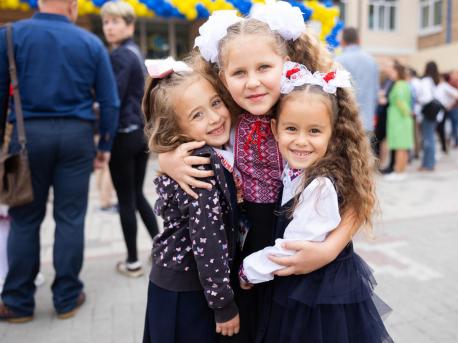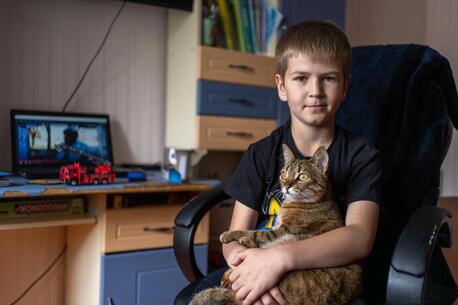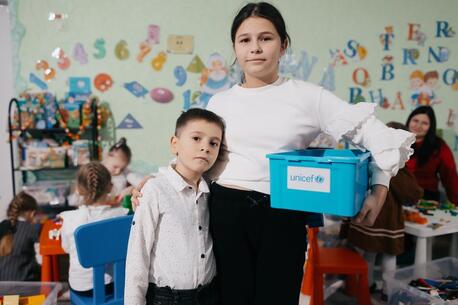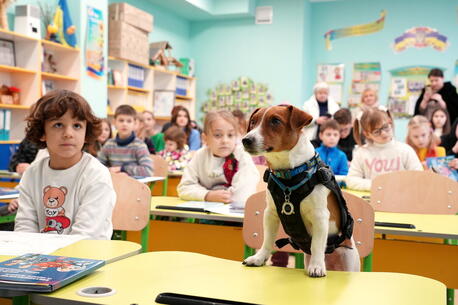
Partners Helped UNICEF Create a Better Future for Children in 2022
2022 was another year of challenge and change for millions of the world’s most vulnerable children.
The war in Ukraine, the accelerating impacts of climate change, the debilitating effects of widening income and technology inequality, and the rippling repercussions of a global pandemic threatened children around the world.
Shining through those dark clouds were rays of inspiration and hope. UNICEF’s dedication was matched by a set of corporate partners who showed an equal commitment to creating a world where every child is healthy, educated, protected and respected.
Together, UNICEF and its corporate partners delivered critical aid and emergency care, built sustainable health care systems and infrastructure to facilitate systemic change, and equipped children and teenagers with access to new technologies that will help them pave paths to prosperous futures.
Here are a few highlights of the results achieved working side-by-side to create a better future for children:
Creating systemic change to protect children’s health

Thousands of India’s frontline health care workers, like these in Telangana, have used UNICEF’s Sharecare mobile app to cope with mental stress, avoid exhaustion and preserve their emotional well-being. © UNICEF/UN0589797/India Country Office
In 2022, UNICEF and partners concentrated on strengthening health systems to deliver sustained physical and psychological care to infants, children, teenagers and families.
In India, UNICEF joined forces with the Johnson & Johnson Foundation, a long-time supporter, to conduct more than 407,000 training sessions for community-based health care workers in order to bring lifesaving care and healthy habits to communities when they need it most.
With Johnson & Johnson’s support, UNICEF partnered with India’s National Institute of Mental Health and Neurosciences to focus these training sessions on the psychosocial and mental health of India’s frontline health care workers.
The partnership, which included India’s Ministry of Health and Family Welfare and USAID, launched an expanded version of the Sharecare app – a mobile app dedicated to supporting health care workers' psychological well-being from anywhere at any time. Sharecare offers India’s health care workers access to self-help questions and answers, a 24/7 interactive chat with mental health experts, informational videos on managing stress, and the ability to conduct a self-check mental analysis.
India’s frontline health care workers used the Sharecare app to learn how to better cope with mental stress, avoid exhaustion and preserve their emotional well-being. Assessment studies at regional health clinics showed that Sharecare helped increase workers' confidence and motivation levels, reduced their fears and apprehensions, and enabled them to continue to deliver critical care to the most vulnerable.
Elsewhere in India, two important UNICEF partners, GP Cellulose and Xylem Watermark, helped to develop UNICEF India’s water, sanitation and hygiene (WASH) programs. Xylem’s continued support aims to reach more than 3.4 million children with improved awareness and access to WASH measures in schools and preschools in vulnerable communities by the end of 2023. Learn about this work in this Q&A with a UNICEF WASH specialist.
Building healthier environments for children

Eight-year-old Anik lives near a lead-acid battery recycling plant in Kathgora, Bangladesh. His blood had more than five times the normal level of lead. Clarios’ support for UNICEF’s Healthy Environments for Healthy Children program helped fund cleanup of the site, which reduced local children’s lead blood levels by 42 percent. © UNICEF/UN0581379/ Gregory
UNICEF believes no child anywhere should have their future predetermined because of where they live.
More than 1 in 4 children’s death under the age of 5 is attributed to environmental risks. Over 300 million children live in areas where they breathe in toxic air six or more times higher than international guidelines. Nearly a third of the world’s children – up to 800 million – are affected by lead poisoning; more than three-quarters of them live in low- and middle-income countries.
Lead affects almost every organ in a child’s body including the heart, lungs and kidneys and can do irreversible harm to a child’s developing brain, causing behavioral disorders and learning problems. Childhood lead exposure can be devastating to a child’s immediate and long-term physical and mental development.
This year, UNICEF and its partner, Clarios Foundation, kicked off the second phase of a multi-year commitment to protect children from the impacts of climate change.
In 2022, Clarios pledged a $20 million, four-year grant to support UNICEF’s Healthy Environments for Healthy Children (HEHC) program, as well as a $10 million match to other donors who join the effort to create healthier environments for children. With support from Clarios Foundation, HEHC will develop responsive primary health care to protect children from pollution and climate change, and mobilize broader multi-sectoral action, including the involvement of young people.
With Clarios Foundation’s initial grant of $6.3 million in 2020, UNICEF is helping to protect more than 70 million children from lead exposure in Bangladesh, Georgia, Ghana and Indonesia. In Georgia, UNICEF has partnered with the government to open a cutting-edge laboratory that can conduct blood lead-level analysis, as well as test for other children’s environmental health risks.
Protecting infants and empowering young women

In 2022, Kimberly-Clark’s grant enabled UNICEF to expand access to early childhood development (ECD) services like the kangaroo mother care method to support the development of premature babies. “They taught me how to put him upright on my chest. When I laid him on my skin he breathed perfectly,” says Jenniffer Almánzar, a mother in the Dominican Republic. “The program has helped me a lot.” © UNICEF/UN0505304/Guerra
In Latin America, where one child dies every three minutes from preventable diseases — 52 percent in the first 28 days of life — access to health and protection programs is a critical lifesaving need. The journey from birth to infancy to childhood to puberty to adulthood is especially challenging for girls, a startling number of whom lack access to essential care and hygiene resources.
In 2019, Kimberly-Clark provided UNICEF with a $7.2 million grant to improve the lives of nearly 2 million infants and children in 16 Latin American and Caribbean countries. Kimberly-Clark and UNICEF are expanding the Huggies global No Baby Unhugged program to improve maternal and neonatal health, create baby-friendly environments in hospitals and clinics, and train frontline health care workers.
As part of its purpose to deliver Better Care for a Better World, Kimberly-Clark also committed $1.5 million in 2020 to support UNICEF’s campaign to reduce infant mortality and improve neonatal health in Vietnam. With this grant, UNICEF is training neonatal health care workers on early essential newborn care and kangaroo mother care to improve new mothers’ access to essential health care services. These initiatives will directly benefit an estimated 265,000 newborns over the next three years — and indirectly help more than 1 million newborns annually.
In China, Kimberly-Clark is supporting UNICEF through its Huggies brand to improve health and development outcomes for children up to age 3 and their caregivers in underdeveloped central and western areas of the country. The program is expected to directly benefit more than 7.3 million newborns and children and indirectly benefit over 14 million more.
UNICEF and Kimberly-Clark are also partnering in Indonesia to support the health and development of teen girls. Kimberly-Clark has integrated its Softex DariSaudari social campaign with UNICEF’s WASH program and is co-promoting UNICEF’s menstrual health and hygiene educational app, OKY, to educate 10,000 young girls on the importance of proper menstrual hygiene. This program implementation in Indonesia will help 80,000 people live in a safe and clean environment.
Kimberly-Clark and UNICEF have been partners for more than 20 years, working together to create a more equitable world for every child. This aligns with Kimberly-Clark's global ambition to uplift the lives of 1 billion people in vulnerable and underserved communities by 2030, with the smallest environmental footprint.
The partnership has helped UNICEF maintain and scale critical community programs in more than 18 countries across the world, providing supplies, health care, sanitation, nutrition and emergency response support to provide a better future for the next generation.
UNICEF promotes women’s health and supports gender equality as a human right. UNICEF and partners relentlessly advocate for and implement programs dedicated to gender equality and the equitable distribution of tools that will help every child create a better future for themselves.
Since 2019, Pandora, the world’s largest jewelry brand, has helped UNICEF support children worldwide to pursue their dreams, express themselves and fulfill their potential, with programs in education, life skills, gender equality and personal empowerment. Last year, the programs helped more than 129,000 children, and more than 264,000 children benefitted from these activities indirectly.
Turning today’s youth into tomorrow’s leaders

SAP and UNICEF have extended their partnership for another three years and expanded it to three new countries: South Africa, Nigeria and the Philippines. The collaboration is helping students like Ma Thi Si, an 11-year-old girl in Vietnam, develop digital skills and explore virtual new worlds. “When we learn science, the teachers usually go dryly through the textbooks and explain things using the blackboard,” she said. “This is so different!” © UNICEF/UN0610416/Le Vu
Technology can be a ticket to a new future for millions of children and teens – but only if they are equipped with the skills to harness it.
In 2019, UNICEF and SAP launched a strategic partnership in support of Generation Unlimited (GenU) to help prepare young people for the workforce by equipping them with the hard and soft skills they need to succeed in the digital workplace.
Over the past three years, the partners have supported the development and implementation of scalable education models in India, Turkey and Vietnam, and the results have far exceeded expectations. Today, more than 3 million young adults – more than double the original goal – have access to critical digital and life skills. In 2022, UNICEF and SAP committed to continuing their partnership for another three years to help prepare young people for the workforce.
Responding to the needs of families devastated by the war in Ukraine
With a long history of work in Ukraine, UNICEF was well positioned to work with the government and local partners to deliver safe water and humanitarian supplies after the war escalated in February 2022, along with ensuring access to education, psychosocial support and emergency cash assistance to Ukrainian families in need.
Pandora was the first corporate partner to answer UNICEF’s call for support to its Ukraine response with a swift donation of $1 million. This contribution was followed by generous grants of more than $1 million from supporters including Visa Foundation and Pfizer Foundation. Epic Games, with help from the Xbox and the Fortnite community, raised over $144 million in a two-week campaign, a portion of which was donated to UNICEF’s work.
The Walt Disney Company provided a contribution and leveraged its networks and channels to bring nationwide awareness to UNICEF’s humanitarian efforts in and around Ukraine. ABC’s many on-air calls for support helped raise over $3 million from the public, including donations following interviews and on-location broadcasts of "World News Tonight with David Muir."
The generosity of these partners and others have enabled UNICEF to supply more than 3.5 million people with access to safe drinking water and 1 million with access to critical WASH supplies. UNICEF has provided 4.5 million children and women in Ukraine with access to primary health care at UNICEF-supported mobile facilities, and has reached more than 2.2 million children and caregivers with mental health and psychosocial support interventions.
UNICEF won’t stop until our vision of a world that helps every child thrive becomes a reality. This can only happen with the continued support of our corporate and foundation partners.
If you would like to discuss a partnership with UNICEF, please contact corporatepartnership@unicefusa.org.
Top photo: On Sept. 1, 2022, at School No. 17 in Irpin, Ukraine, children are excited to begin their first day of the new school year. Since the escalation of the war in February 2022, UNICEF and partners have joined forces to ramp up support and services for Ukraine's children. © UNICEF/UN0698298/Uhov
HOW TO HELP
There are many ways to make a difference
War, famine, poverty, natural disasters — threats to the world's children keep coming. But UNICEF won't stop working to keep children healthy and safe.
UNICEF works in over 190 countries and territories — more places than any other children's organization. UNICEF has the world's largest humanitarian warehouse and, when disaster strikes, can get supplies almost anywhere within 72 hours. Constantly innovating, always advocating for a better world for children, UNICEF works to ensure that every child can grow up healthy, educated, protected and respected.
Would you like to help give all children the opportunity to reach their full potential? There are many ways to get involved.





